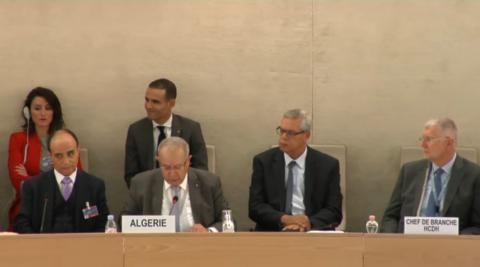
On 11 May 2017, the Working Group on the Universal Periodic Review (UPR), established by the Human Rights Council (HRC), adopted a report containing the recommendations made by United Nations Member States to Algeria during the State’s review which took place on 8 May 2017. While Member States commanded the efforts made since the second UPR, they however expressed concern over the persistence of torture, death penalty, the absence of investigation on cases of enforced disappearances as well as the undue restrictions to the rights to freedom of expression, association and peaceful assembly. These issues were brought to the attention of UN Member States in Alkarama’s report of September 2016 submitted to the HRC ahead of Algeria’s review. Among other issues raised by Members States were violence against women as well as rights of minorities and children.
Enforced disappearances and right to truth and justice of families of victims
As emphasised in Alkarama’s report, Algeria has the fifth highest rate of cases pending before the Working Group on Enforced or Involuntary Disappearances (WGEID) with 3139 unsolved enforced disappearances due to the authorities’ lack of cooperation. In addition, and since 2000, the Algerian authorities have constantly postponed the WGEID’s requests to visit the country. Moreover, no less than 30 decisions of the Human Rights Committee (HR Committee) asserting the violation of the right to truth and justice of families of victims remain unimplemented in spite of Algeria’s international obligations. Therefore, several Member States, including Iraq, Portugal, Ukraine, Sierra Leone and Zambia, echoed Alkarama’s concerns and recommended the government of Algeria to implement the recommendations of the HR Committee and to send, without undue delay, a standing invitation to the WGEID for a country visit.
Finally, bearing in mind Algeria’s acceptance to “take measures to ratify the International Convention for the Protection of All Persons from Enforced Disappearances” during its first review, Member States reiterated their previous recommendation, calling on Algeria to ratify Convention for the Protection of All Persons from Enforced Disappearance (ICPPED).
Practice of torture and the death penalty
In its report, Alkarama emphasised that torture remains of concern as domestic law does not ensure the non-admissibility of forced confessions in courts. During the UPR, several Member States, including Denmark, Honduras, Rwanda, Portugal, Spain, UK, Guatemala, Bosnia and Chile, recommended Algeria to prohibit and punish the practice of torture and to ratify the Optional Protocol to the United Nations Convention against Torture necessary to establish an independent, effective and well-resourced national preventive mechanism. They further encouraged Algeria to develop training programmes on human rights for law enforcement officers.
As underlined in Alkarama’s report, even though Algeria has observed a moratorium on the capital punishment since 1993, death penalty is still pronounced, especially in terrorism cases. Following its last UPR, the Algerian delegation merely noted the recommendations calling for the ratification of the Second Optional Protocol to the International Covenant on Civil and Political Rights (ICCPR). During this third review, several Member States including Australia, Luxembourg, Ireland, Uruguay, France, Namibia, Montenegro, Portugal, Italy and Brazil reiterated their previous recommendations encouraging Algeria to continue commuting death sentences and maintain the de facto moratorium in view of its formal abolition.
Limitations to freedoms of expression, association and peaceful assembly; reprisals against human rights defenders
In its report, Alkarama highlighted that, following his country visit of April 2011, the Special Rapporteur on the promotion and protection of the right to freedom of opinion and expression (SRFRDX) noted that although the 2014 Constitution enshrines the right to freedom of expression, this right is still not fully guaranteed due to the lack of reform of Law No. 12-05 on information. Repression against peaceful opponents critical of the government, including journalists, persists and leads to arbitrary arrests and censorship. In addition, the Criminal Code still imposes heavy fines on every person who causes offence to the President, including any “offensive, insulting or defamatory expression, through writings, drawings or discourse”. Echoing Alkarama’s concerns, a large majority of Member States including Italy, Australia, Canada, Luxembourg, Kenya, Sweden, Ireland, France, Tunisia, US, Spain, Netherlands and Switzerland, recommended Algeria to abolish all prison sentences for press-related offences, to decriminalise defamation and to adopt a framework to protect journalists from intimidation and harassment,
Furthermore, in its report, Alkarama underlined numerous limitations to freedom of association, particularly the undue control of the executive discretionary power to refuse registration of associations under the pretext of non-compliance with “national values, public order, public decency and the provisions of existing legislation”. During the review, numerous Member States encouraged Algeria to lift all restrictions on the registration of associations to make procedures more flexible and to ensure a safe environment for association to fulfil their activities. They further encouraged the authorities to reform the Association Law No. 12-06 of 2012 to provide a clear and unambiguous legal foundation for the work of civil society organizations.
Finally, Alkarama expressed particular concern over the incrimination of “unarmed gatherings” and noted that peaceful assembly remains prohibited in the wilaya of Algiers, while peaceful gatherings continue to be violently suppressed. In line with Alkarama’s concerns, several Member States including Luxembourg, US, Norway and Argentina, recommended Algeria to refrain from hampering the legitimate work of NGOs and human rights defenders.
What is next?
Overall, Algeria received 229 recommendations from UN member States, which the country must consider before September 2017 and inform the Human Rights Council of whether these are accepted or rejected. The State should then implement the accepted recommendations before its fourth UPR cycle in 2021, in order to improve the human rights situation on the ground.
For more information or an interview, please contact the media team at media@alkarama.org (Dir: +41 22 734 1008).
